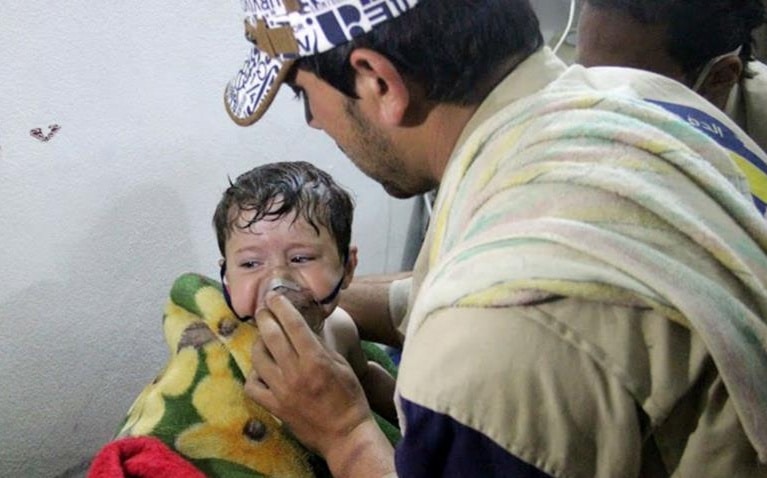A medic treats a young victim after a chemical attack on Latamineh in northwest Syria, March 2018
In a step likely to agitate the Assad regime — and spur its supporters into criticism and disinformation — the Organisation for the Prohibition of Chemical Weapons will resume assignment of blame for chemical attacks in Syria’s 92-month conflict.
Fernando Arias, the new head of the OPCW, said on Tuesday that a team of 10 experts will be hired soon to carry out the task.
Between 2015 and 2017, the Joint Investigative Mechanism — overseen by the OPCW and the UN — had the mandate to assign responsibility for sarin and chlorine assaults. It formally found the Assad regime culpable for a series of attacks, as well as blaming the Islamic State for three incidents.
After the JIM concluded that the regime carried out an April 2017 sarin attack in northwest Syria that killed about 90 people and injured hundreds, Russia vetoed the Security Council’s extension of the JIM’s mandate. But in the spring, the UN General Assembly gave the OPCW authority to assign responsibility.
Since the regime’s August 2013 use of sarin on seven sites near Damascus, killing more than 1,400 people, Russia and Damascus have devoted themselves to a propaganda and disinformation campaign to divert blame. They have been aided by social media supporters who have spread a series of falsehoods, in an attempt to absolve the regime through confusion and conspiracy theory.
The Assad regime’s last suspected chemical attack was in April 2018 on Douma in the East Ghouta region near Damascus. The double assault forced the final surrender of rebels, with the displacement of tens of thousands of resident to opposition-held northwest Syria.
How an Obscure UK Blogger Became Russia’s Top Disinfo Warrior Over Syria’s White Helmets
Fog of Trolls: Pro-Assad Misinformation Over Douma Chemical Attacks
The new OPCW team will look into incidents dating back to 2014. A recent investigation by the BBC set out evidence for 33 attacks by the Assad regime and six by ISIS.
“The mandate is to identify the perpetrators of crimes committed with chemical weapons,” Arias said. He added that, as “the OPCW is not a court or the police”, it will refer cases to UN organizations with powers to punish those responsible.

